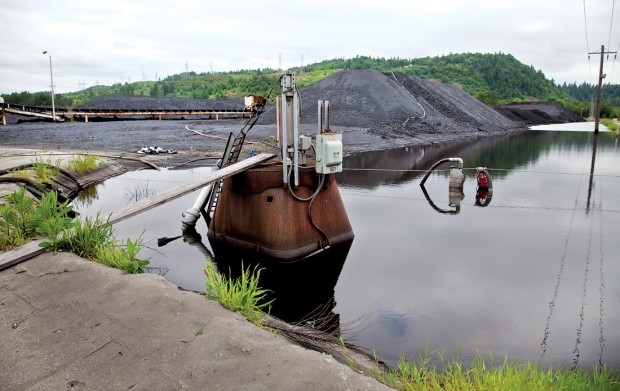forum
library
tutorial
contact

Millennium Focused on Cleanup as
Coal Terminal Process Plays Out
by Scott LearnThe Daily News, June 13, 2011
|
the film forum library tutorial contact |

|
Millennium Focused on Cleanup as
by Scott Learn |
 When Millennium Bulk Terminals bought the buildings and equipment for $10.9 million at the former Reynolds Metals Co. site in January, company officials say they found a mess they needed to clean up if they wanted to build a new coal export terminal.
When Millennium Bulk Terminals bought the buildings and equipment for $10.9 million at the former Reynolds Metals Co. site in January, company officials say they found a mess they needed to clean up if they wanted to build a new coal export terminal.
"It looked like a filthy 'Terminator' site. Junk everywhere. There was just a lot of crap out there," Joe Cannon, Millennium's president and CEO, said Monday.
Old fire trucks clogged the roads on the 416-acre site off Industrial Way. Stormwater leaked from giant piles of black, powdery petcoke left onsite by the previous tenant, Chinook Ventures, and seeped into the soil and Columbia River. The soil had been contaminated by six decades of aluminum making.
Millennium officials say they plan to spend tens of millions of dollars cleaning up the site over the next decade, both to fix the decades of pollution from Reynolds and five years of potential safety violations from Chinook. Managing the leaking stormwater from the petcoke -- a byproduct of petroleum refining -- is costing $150,000 a month alone, Millennium officials say.
That's why Millennium needs to build the new terminal to haul millions of tons of coal from the Powder River Basin in Montana and Wyoming to energy-hungry China, which burns three to four billion tons of coal each year, Cannon said. An new application for a coal terminal -- still of undetermined size -- will be submitted in "months, not years," he said.
"We did not buy this facility for the great privilege of cleaning it up," Cannon said during a Monday meeting with The Daily News editorial board.
The company plans to submit its updated cleanup plan to the state's Department of Ecology this summer, said Kristin Gaines, Millennium's manager of environment and health.
She added that Millennium has already notched some successes. Chinook left behind 2 million gallons of corn milk, a byproduct of ethanol production, which, while not hazardous, produces an acrid stench. The company spent $300,000 to haul out the product earlier this year to Three Rivers sewage treatment plant on Fibre Way, Gaines said.
Ecology officials, who meet monthly with Millennium to check the progress, say the company is taking its cleanup task seriously.
"They know what they need to do, and they're working on it. They've got a lot to do to clean up the messes that were created before them," said Garin Schrieve, Ecology's industrial section manager.
Last fall, Millennium filed for permits to export 5.7 million tons of coal annually from the site. The coal would be hauled on one or two mile-long trains daily, then loaded on freighters and shipped to Asia, mostly to China and South Korea, company officials said. Millennium is a subsidiary of Ambre Energy, an Australian coal giant. St. Louis-based Arch Coal owns a 38 percent share of Millennium.
In January, just as Millennium was closing the deal to buy the building and equipment onsite from Chinook for $10.9 million, internal company e-mails showed that Ambre officials were looking at expanding to export 20 million or 60 million tons of coal. Opponents accused the company of misleading the public, and Millennium withdrew its permit application with Cowlitz County and went back to the drawing board.
The company's new filing for a coal terminal permit will include an environmental assessment of exporting as much as 60 million tons, Cannon said. However, that amount is unlikely without significant rail expansion through Longview, he said.
Cannon said last week's fire at an onsite wastewater treatment facility won't significantly delay the permit application. The fire remains under investigation.
Cannon added that he recognizes that the company suffered a credibility hit when its internal discussions of expanding the terminal became public.
But he said Millennium has no intention of backing away or shirking its environmental responsibilities. Cannon -- a former high-level U.S. Environmental Protection Agency administrator in the Reagan Administration under William Ruckelshaus -- said he helped develop federal Clean Air Act regulations and led the charge to remove lead from gasoline.
"We don't expect our environmental pals out there to paint us in the best light," Cannon said.
Compared to other coal China likely would buy, Cannon said, coal from the Powder River Basin contains 90 percent less mercury, a contaminant that would drift across the Pacific Ocean to the Northwest once the coal is burned in Asia.
The terminal's biggest contribution to climate change, he said, would be emissions from freight trains as they haul coal from the Rocky Mountain states to Longview. That's no different than hauling grain the same distance, Cannon said. The coal terminal project, he said, should be treated no differently by regulators than the new grain terminal rising at the Port of Longview.
"As long as coal is treated like grain, or any other commodity, we're fine with that," Cannon said.
Millennium currently is importing alumina, the raw product of aluminum, to Alcoa's Wenatchee smelter. The company also is unloading about 9,000 tons of coal a month from Montana and Wyoming, which Weyerhaeuser Co. uses to power its mill.
Related Sites:
Alcoa to Upgrade Longview Dock by Staff, The Wenatchee World, 6/24/11
learn more on topics covered in the film
see the video
read the script
learn the songs
discussion forum
